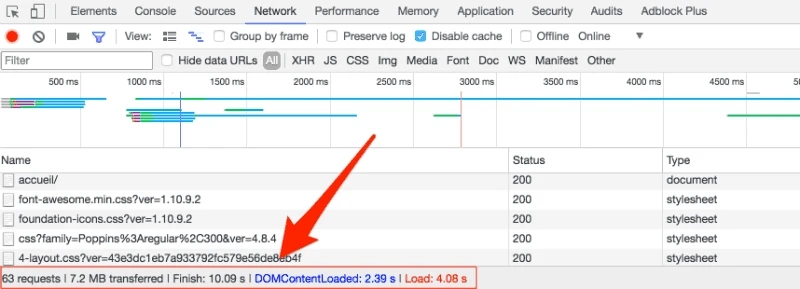I have a slow WordPress website. How can I fix it?
Having a slow WordPress website does not benefit anyone. It is annoying for your visitors to navigate and the chance that they will leave your site to visit competitors increases drastically.
When visitors leave your website because of its slow performance, it means you are losing sales. You must fix this quickly and optimize the performance of your WordPress site.
How do I know if my site is slow?
When a page takes more than 3 seconds to load, a website is considered slow. Ideally, display time should be below one second to get the best results (and to create jealousy!).
Your website is a target…
We’re all in hackers’ crosshairs. Get your free analysis of your current situation in less than 5 minutes.
Many tools are available to test the loading time. A good indication is the web inspector of your browser. If you need more precision, you can also use dedicated tools such as GTMetrix or Pingdom. However, these two services give a lot of technical information, and may not be of any help if you cannot interpret them properly.
(To see this screen in Chrome, you have to right-click in the window and choose “Inspect Element.” Then go to the “Network” tab. Once there, refresh the page to get the information as shown)
In the screenshot shown, the loading of the page structure (DOMContenteLoaded in blue) in the browser, without regard to style sheets, images and frames, has taken 2.39 seconds to load. The complete loading of the page (Load in red) allowing the visitor to see the page has taken 4.08 seconds.
For more information about the Chrome Inspector, you can visit the Network Analysis Reference section on Google’s website.
But why is my website slow?
There are several reasons why a site may be slow. The diagnosis of this is complex. Typically, here are the three main elements that need to be taken into account:
- The Web Hosting
- The quality of the website’s code
- The volume and the quality of the data returned to the visitor
Each of these three main categories can be subdivided into subcategories that allow us to dig deeper. What is important to understand here is that if one of these categories is deficient, the website will be affected.
Web Hosting
When it comes to web hosting, it is recommended that the web servers used are up to date in terms of hardware (e.g. SSD disk) and software (e.g. use of the latest version of PHP). In addition, if you are on shared hosting ( which is the case for most websites), and other sites sharing the same server as yours are resource consuming and inefficient, then the performance of your site will be affected. Also, the geographic proximity between your visitors and your web server has an impact; we try to reduce this distance in order to have less speed loss. The closer it is, the better.
Quality of the code
Then, you need to check the quality of your website’s code. Even if you use the best hosting service available on the market, it will be totally useless if your the code of your website is inefficient (uses more resources than it should). Efficient and well executed code should not impact the speed of your website. More specifically, we are referring to the choice of extensions (plugins) used, the theme and the custom code that could have been used when creating the site
Quantity and quality of data returned to the visitors
Finally, the volume and quality of the data returned to the visitor will affect the loading speed. If the amount of resources sent to your visitors is too big, if the size of the resources is too heavy, or if the structure of your pages creates what is called “blocking”, your visitors will suffer. And so will you.
Do I need a cache plugin?
So now that you know the 3 main factors that can cause problems… then what should you do? That is easier said than done!
The first step is to identify the cause of the slow speed using a diagnostic. For each of the above factors, tests will be performed to verify if a problem has been detected. This can quickly become complex in some cases because. Taken individually, each factor may not cause a problem, but combined with other factors, it can cause certain slowdowns. This is where an expert’s know-how will make all the difference, to properly address the situation.
In our opinion, the worst thing to do is to install a caching extension without understanding the reason behind the slow site. By installing such an extension not understanding de cause, the problem is simply hidden and this solution often acts like a band-aid on an open wound!
That’s why we always start with an in-depth analysis of the situation. Basically, we go through your site’s configuration thoroughly in order to identify the cause(s) of the site’s slowness. Following this analysis, we make recommendations in order to correct the identified problems. And voila!
You need assistance to get your WordPress website up to speed? Contact one of our WordPress experts!




